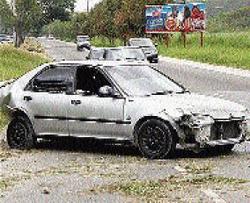
McGregor
Under the Road Traffic Act, we are all required to insure our motor vehicles to avoid prosecution. However, most persons may be unaware of the fact that having a valid certificate of insurance does not guarantee them coverage at the time of an accident or loss.
Due to the peculiar nature of insurance contracts, the prospective insured is required to give full and accurate information when signing the initial document known as the proposal form.
This is important because the potential insurer determines whether to insure property after he has assessed the risks. For this reason, confirmation of the ownership of the motor vehicle, the purpose for which the vehicle will be used, the persons who are likely to drive the vehicle and their accident records are all relevant to the assessment of the risks.
However, vital information is often omitted from these proposal forms. One common example is the fact that the potential insured intends to operate the vehicle as a taxi or for the purpose of carrying goods. A motor vehicle that is driven for 10 hours during the day is exposed to a greater risk of accident than one which is merely driven for one to two hours each day travelling to and from work. For this reason, the owner of a taxi is likely to pay a higher premium for insurance than a bank teller.
If, after obtaining the certificate of insurance, the insured uses the motor vehicle for purposes which were not disclosed on the proposal from, e.g., to operate a taxi, the insurer may be entitled to withhold payments in the event of an accident or other loss. The insurer will be entitled to avoid the policy of insurance, as if it had never existed. Many persons are likely to suffer if the insurer decides to avoid the policy:
1. The owner of the vehicle may be unable to access funds to repair or replace the vehicle which has been damaged or lost.
2. Persons who are injured in an accident will not be able to recover compensation from the insurer of the vehicle.
3. The owner of any third party vehicle will be unable to recover compensation from the insurer of the vehicle with which he collided.
They say a word to the wise is sufficient, so it is worth noting that all persons who travel in robot taxis which bear ordinary licence plates run the risk of being unable to recover any compensation from the insurer of that taxi if it is involved in an accident.

Sherry-Ann McGregor is a partner and mediator with the firm Nunes, Scholefield, DeLeon & Co. Send feedback and questions to lawsofeve@yahoo.com or Lifestyle@gleanerjm.com.

